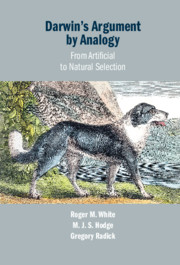Book contents
- Darwin’s Argument by Analogy
- Additional material
- Darwin’s Argument by Analogy
- Copyright page
- Contents
- Preface
- Introduction
- Chapter 1 Analogy in Classical Greece
- Chapter 2 Analogy in the Background to the Origin
- Chapter 3 Darwin’s Analogical Theorising before the Origin
- Chapter 4 The ‘One Long Argument’ of the Origin
- Chapter 5 An Analysis of Darwin’s Argument by Analogy
- Chapter 6 Darwin’s Use of Metaphor in the Origin
- Chapter 7 Rebuttals of the Revisionists
- Chapter 8 Wider Issues Concerning Darwinian Science
- References
- Index
Chapter 4 - The ‘One Long Argument’ of the Origin
Published online by Cambridge University Press: 21 October 2021
- Darwin’s Argument by Analogy
- Additional material
- Darwin’s Argument by Analogy
- Copyright page
- Contents
- Preface
- Introduction
- Chapter 1 Analogy in Classical Greece
- Chapter 2 Analogy in the Background to the Origin
- Chapter 3 Darwin’s Analogical Theorising before the Origin
- Chapter 4 The ‘One Long Argument’ of the Origin
- Chapter 5 An Analysis of Darwin’s Argument by Analogy
- Chapter 6 Darwin’s Use of Metaphor in the Origin
- Chapter 7 Rebuttals of the Revisionists
- Chapter 8 Wider Issues Concerning Darwinian Science
- References
- Index
Summary
Here we examine how the Origin deploys the selection analogy. Darwin works in a vera causa tradition. To discover the true cause of some phenomenon, one first establishes that the cause exists (an existence case); then shows that it has the power to produce the effect (an adequacy case); and finally that it has in fact done so (a responsibility case). After examining how breeding practices produce new varieties, Darwin establishes the existence of natural selection. In the wild, resources are limited, and so there is a struggle for existence, with the individuals with the most favourable traits most likely to survive. Next comes the argument showing that natural selection should produce new species, that it is causally competent and adequate. This argument includes reasoning a fortiori: natural selection, being far more comprehensive, precise and prolonged than artificial selection, is a much greater power and so able to produce the adaptive diversification of distinct species over eons of time. Darwin, in later chapters, offers evidence that natural selection has in fact been responsible for producing new species, new genera and even new classes of animals and plants.
Keywords
- Type
- Chapter
- Information
- Darwin's Argument by AnalogyFrom Artificial to Natural Selection, pp. 106 - 136Publisher: Cambridge University PressPrint publication year: 2021

